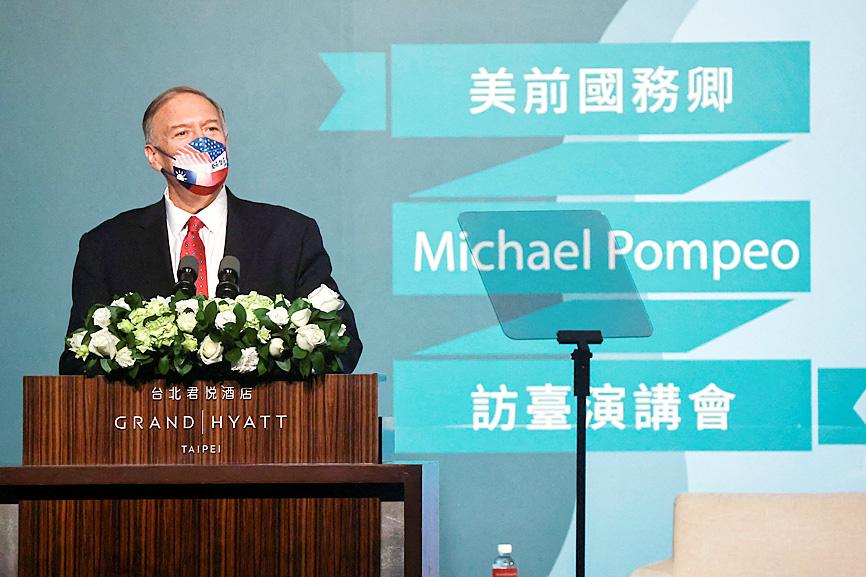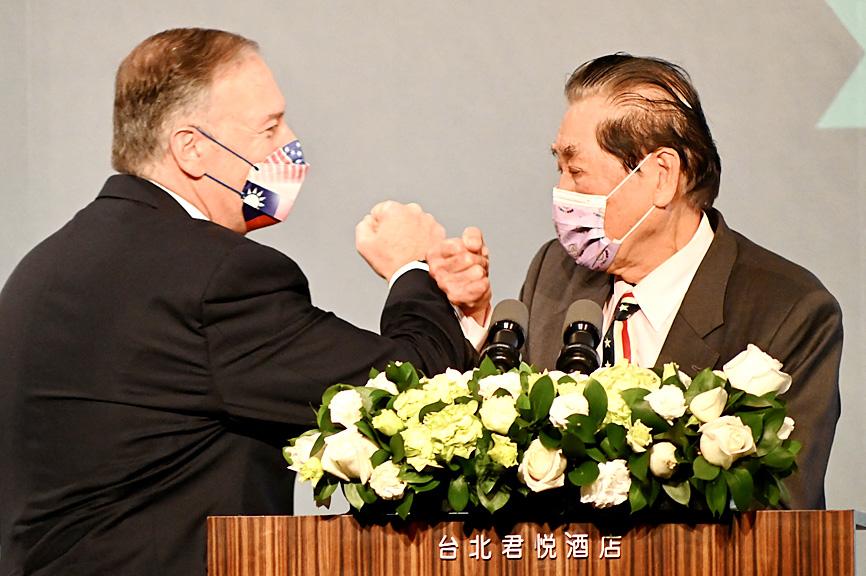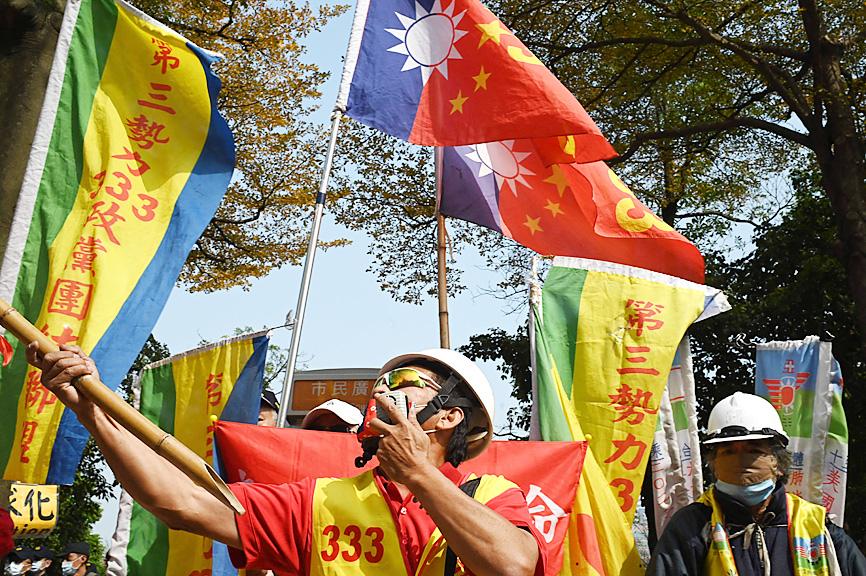Officially recognizing the Republic of China’s (ROC) sovereignty is “easy” and “the right thing to do,” former US secretary of state Mike Pompeo said yesterday in an interview with the Taipei Times in Taipei.
“It’s easy to do. It’s the right thing to do. It’s the morally proper thing to do. It’s not hard,” said Pompeo, who served from April 2018 to January last year under the administration of former US president Donald Trump.
“I think the moment calls for clarity, transparency and a deep recognition of the central idea that we’ve all known: that Taiwan is not a part of China,” he added, joking that the nation’s issuance of a visa for him to visit illustrates “its enormous independence from mainland China.”

Photo: Ann Wang, Reuters
In a speech earlier in the day, Pompeo made the same assertion that the US should offer Taiwan diplomatic recognition as a “free and sovereign country,” urging the US to move away from its long-time policy of “strategic ambiguity.”
“Today I come here as a private citizen, but it is an imperative to change 50 years of ambiguity. It is about America’s diplomatic recognition of the Republic of China, while the US should continue to engage the People’s Republic of China as a sovereign government,” Pompeo said at an event organized by the government-affiliated Prospect Foundation think tank.
“America’s diplomatic recognition of 23 million freedom-loving Taiwanese people, its legal, democratically elected government can no longer be ignored, avoided or treated as secondary,” he said.

Photo: Sam Yeh, AFP
“It is my view that the US government should immediately take necessary and long-overdue steps to do the right and obvious thing, that is, to offer the Republic of China America’s diplomatic recognition as a free and sovereign country,” he said.
“This is not about Taiwan’s future independence. It is about a recognition of an unmistakable, already existent reality,” he said. “There is no need for Taiwan to declare independence because it is already an independent nation. Its name is the Republic of China. The people and government of the United States should simply accept this fundamentally decent, morally right thing. Taiwanese people deserve the world’s respect for continuing down this free, democratic and sovereign path.”
The Ministry of Foreign Affairs yesterday declined to comment on Pompeo’s remarks, saying only that it respected his comments.

Photo: Sam Yeh, AFP
Taiwan-US relations have grown steadily over the past few years with bipartisan support in Washington, providing a solid foundation for Taipei to expand cooperation and partnerships between the countries across various domains, it said in a statement.
At a news conference hosted by Prospect Foundation executive director Lai I-chung (賴怡忠), Pompeo was asked to assess the likelihood of China invading Taiwan.
The level of risk across the Taiwan Strait cannot be assessed separately from Washington’s willingness to provide arms and training, or Taipei’s willingness to pay for them, Pompeo said.
“It turns on the willingness of the Western world to demonstrate that the cost for [Chinese President] Xi Jinping (習近平) engaging in that kind of activity are just too high,” he said.
Regarding whether he would run for US president in 2024, Pompeo said that he did “not know what will happen in 2023 or 2024,” but would continue on the “mission to protect democracy and freedom” in the US and around the world.
“We need to defend human dignity and sovereignty, and we need to draw this line between tyranny and democracy so cleanly and so crisply that we can preserve it for the next generation,” he said.
Asked about the purpose of his Taiwan visit, Pompeo said that he wanted to thank Taiwanese for being a good friend and partner of the US during his tenure as the US secretary of state, director of the CIA and senator.
“I wanted to come here because the people of Taiwan are so deeply wonderful and loving of the central ideas that we have in the American founding as well, this idea that liberty matters ... that freedom of speech matters,” he said.
Pompeo, who is visiting Taiwan for the first time, is due to leave today.
The visit follows a 30-hour stopover by a delegation of former US security officials sent by US President Joe Biden to assure Taiwan of the US’ commitment in light of Russia’s invasion of Ukraine.

CHAOS: Iranians took to the streets playing celebratory music after reports of Khamenei’s death on Saturday, while mourners also gathered in Tehran yesterday Iranian Supreme Leader Ayatollah Ali Khamenei was killed in a major attack on Iran launched by Israel and the US, throwing the future of the Islamic republic into doubt and raising the risk of regional instability. Iranian state television and the state-run IRNA news agency announced the 86-year-old’s death early yesterday. US President Donald Trump said it gave Iranians their “greatest chance” to “take back” their country. The announcements came after a joint US and Israeli aerial bombardment that targeted Iranian military and governmental sites. Trump said the “heavy and pinpoint bombing” would continue through the week or as long

TRUST: The KMT said it respected the US’ timing and considerations, and hoped it would continue to honor its commitments to helping Taiwan bolster its defenses and deterrence US President Donald Trump is delaying a multibillion-dollar arms sale to Taiwan to ensure his visit to Beijing is successful, a New York Times report said. The weapons sales package has stalled in the US Department of State, the report said, citing US officials it did not identify. The White House has told agencies not to push forward ahead of Trump’s meeting with Chinese President Xi Jinping (習近平), it said. The two last month held a phone call to discuss trade and geopolitical flashpoints ahead of the summit. Xi raised the Taiwan issue and urged the US to handle arms sales to

State-run CPC Corp, Taiwan (CPC, 台灣中油) yesterday said that it had confirmed on Saturday night with its liquefied natural gas (LNG) and crude oil suppliers that shipments are proceeding as scheduled and that domestic supplies remain unaffected. The CPC yesterday announced the gasoline and diesel prices will rise by NT$0.2 and NT$0.4 per liter, respectively, starting Monday, citing Middle East tensions and blizzards in the eastern United States. CPC also iterated it has been reducing the proportion of crude oil imports from the Middle East and diversifying its supply sources in the past few years in response to geopolitical risks, expanding

Pro-democracy media tycoon Jimmy Lai’s (黎智英) fraud conviction and prison sentence were yesterday overturned by a Hong Kong court, in a surprise legal decision that comes soon after Lai was jailed for 20 years on a separate national security charge. Judges Jeremy Poon (潘兆初), Anthea Pang (彭寶琴) and Derek Pang (彭偉昌) said in the judgement that they allowed the appeal from Lai, and another defendant in the case, to proceed, as a lower court judge had “erred.” “The Court of Appeal gave them leave to appeal against their conviction, allowed their appeals, quashed the convictions and set aside the sentences,” the judges